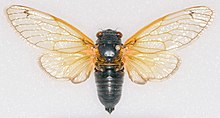Magicicada tredecassini
Appearance
| Magicicada tredecassini | |
|---|---|

| |
| Scientific classification | |
| Domain: | Eukaryota |
| Kingdom: | Animalia |
| Phylum: | Arthropoda |
| Class: | Insecta |
| Order: | Hemiptera |
| Suborder: | Auchenorrhyncha |
| Family: | Cicadidae |
| Genus: | Magicicada |
| Species: | M. tredecassini
|
| Binomial name | |
| Magicicada tredecassini (Alexander & Moore, 1962)
| |
Magicicada tredecassini is a species of periodical cicada endemic to the United States. It has a 13-year lifecycle but is otherwise indistinguishable from the 17-year periodical cicada Magicicada cassini. The two species are usually discussed together as "cassini periodical cicadas" or "cassini-type periodical cicadas." Unlike other periodical cicadas, cassini-type males may synchronize their courting behavior so that tens of thousands of males sing and fly in unison.[1][2][3]
Life cycle
Their median life cycle from egg to natural adult death is around thirteen years. However, their life cycle can range from nine years to seventeen years.[4]
References
- ^ "Periodical Cicada Page". University of Michigan. Retrieved 10 June 2011.
- ^ Capinera, John L. (2008). Encyclopedia of Entomology. Springer. p. 2792. ISBN 978-1-4020-6242-1.
- ^ Alexander, Richard D; Moore, Thomas Edwin (1962), The Evolutionary Relationships of 17-year and 13-year Cicadas, and Three New Species (Homoptera, Cicadidae, Magicicada), Ann Arbor: Museum of Zoology, University of Michigan
- ^ Campbell, Matthew (18 August 2015). "Genome expansion via lineage splitting and genome reduction in the cicada endosymbiont Hodgkinia - Supporting Information" (PDF). Proceedings of the National Academy of Sciences of the United States of America. 112 (33): 10192–10199. doi:10.1073/pnas.1421386112. PMC 4547289. PMID 26286984. Retrieved 13 October 2020.
